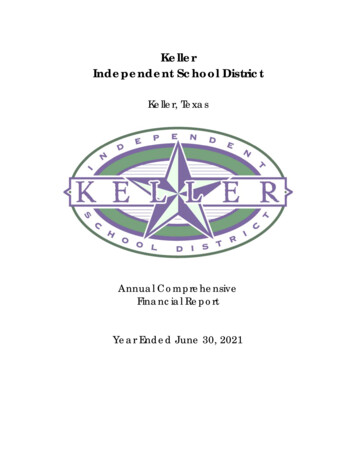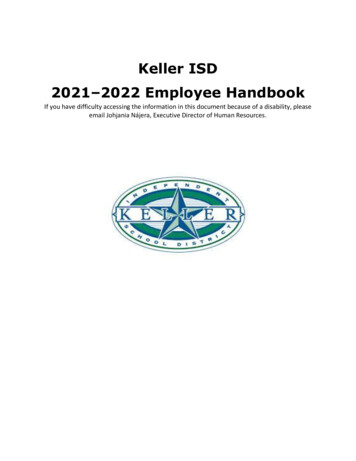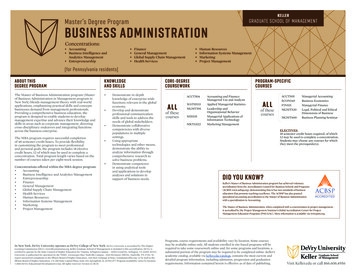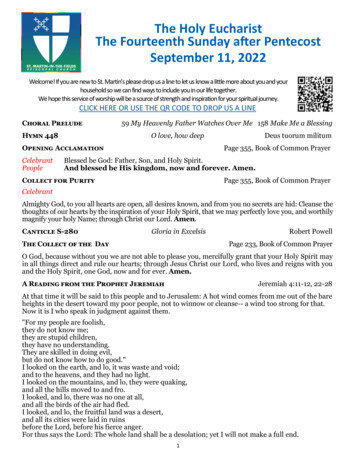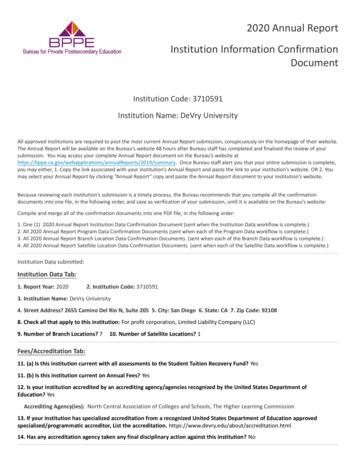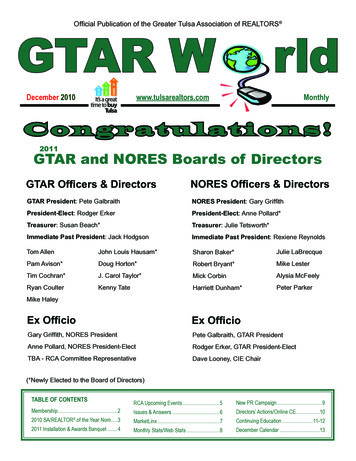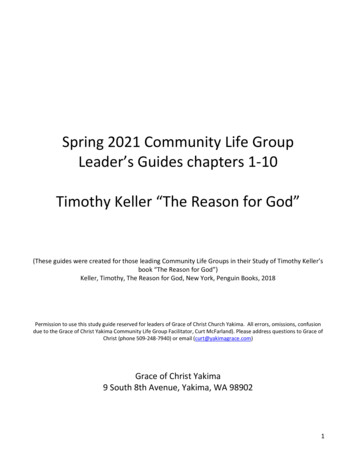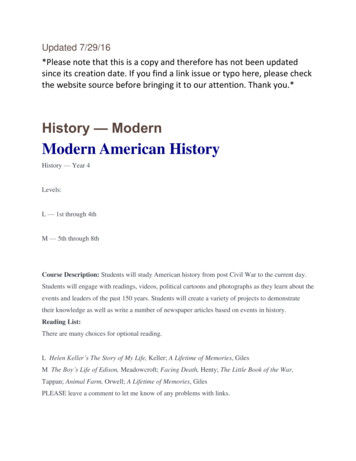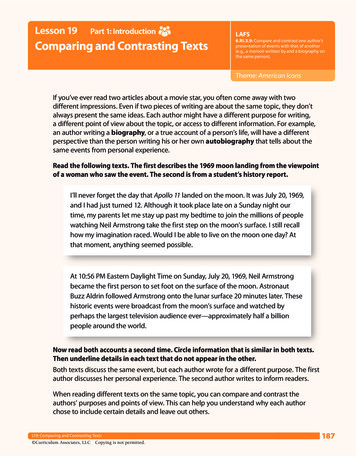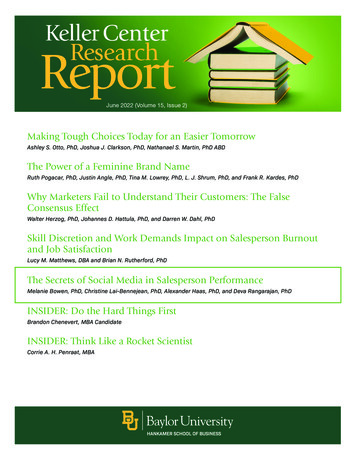
Transcription
Keller CenterResearchReportJune 2022 (Volume 15, Issue 2)Making Tough Choices Today for an Easier TomorrowAshley S. Otto, PhD, Joshua J. Clarkson, PhD, Nathanael S. Martin, PhD ABDThe Power of a Feminine Brand NameRuth Pogacar, PhD, Justin Angle, PhD, Tina M. Lowrey, PhD, L. J. Shrum, PhD, and Frank R. Kardes, PhDWhy Marketers Fail to Understand Their Customers: The FalseConsensus EffectWalter Herzog, PhD, Johannes D. Hattula, PhD, and Darren W. Dahl, PhDSkill Discretion and Work Demands Impact on Salesperson Burnoutand Job SatisfactionLucy M. Matthews, DBA and Brian N. Rutherford, PhDThe Secrets of Social Media in Salesperson PerformanceMelanie Bowen, PhD, Christine Lai-Bennejean, PhD, Alexander Haas, PhD, and Deva Rangarajan, PhDINSIDER: Do the Hard Things FirstBrandon Chenevert, MBA CandidateINSIDER: Think Like a Rocket ScientistCorrie A. H. Penraat, MBA
The Secrets of Social Media in Salesperson PerformanceMelanie Bowen, PhD, Christine Lai-Bennejean, PhD, Alexander Haas, PhD, andDeva Rangarajan, PhDSocial media has become a corecomponent of communication withinour society, and as social media haspositively impacted personal life, it hasalso positively impacted business.Through the years, researchers havestudied the positive impacts socialmedia has on various aspects ofbusiness, from improving sales tocustomer relations. Although manystudies have focused on the impact ofsocial media within the linear selling model,1 few studies have shown the impact of social mediausage within concurrent selling tasks, including how these concurrent selling tasks impactsalesperson performance. Our study focuses specifically on the relationship between socialmedia usage, key selling tasks, salesperson performance, and peer social media usage as arelationship moderator.Impact of Social Media Usage on Key Selling TasksOur initial hypothesis stated that increasing B2B salesperson social media usage is positivelycorrelated with three key selling tasks: value-oriented prospecting, adaptive selling, andproactive servicing.Value-oriented prospecting reflects the idea that salespeople can utilize social media to betteridentify and understand prospective customers through constructing various customer profiles.These profiles would then allow the salesperson to focus on profiles that have the highest valuepotential with respect to sales or profits.The hypothesis also highlights how social media provides the opportunity for salespeople to useadaptive selling, in which salespeople will modify their behavior in customer interactions basedon customer characteristics and situations.2 Social media provides a unique opportunity forsalespeople to interact with customers and understand more about individual customers.Therefore, as salespeople use social media to understand their customers and prospects, they canalso strengthen relationships with each customer by personalizing each interaction.3Third, our hypothesis mentions how social media provides a platform for salespeople to takeinitiative in reaching out to customers in preparation for issues, providing guidance for usage ofproducts, and receiving feedback from customer experiences.4 Not only does this proactive18Keller Center Research ReportJune 2022, Volume 15, Issue 2
The Secrets of Social Media in Salesperson Performanceservicing allow for salespeople to improve customer experience, but it also helps convey howcustomer needs are changing over time.5Although each of these three selling tasks show positive effects resulting from the usage of socialmedia, only value-oriented prospecting and proactive servicing showed significant positiveeffects. Previous findings suggest a relationship between social media usage and adaptive selling,but it is likely that salespeople often do not consider social media as a mechanism in which anactual sale could be closed. Therefore, social media would not have been instrumental infacilitating salesperson adaptability in direct interactions.How Selling Tasks Impact Salesperson PerformanceOur study hypothesized that these three selling tasks—value-oriented prospecting, adaptiveselling, and proactive servicing—directly impact salesperson performance. Specifically, there isa positive relationship between value-oriented prospecting, adaptive selling, and proactiveservicing on salesperson performance. Based on our study, each of these three selling taskssignificantly and positively influence salesperson performance.Increased value-oriented prospecting highlights high-potential prospective customers, allowing asalesperson to better utilize time and increase engagement with these individuals. This higherengagement with high potential prospective customers could, in turn, increase the possibility ofthe prospects becoming actual customers, leading to an increase in salesperson performance.Similarly, the customized customer experience provided through adaptive selling is hypothesizedto increase the likelihood of customer purchasing through increasing customer satisfaction andloyalty. Satisfied customers would, in turn, prompt customer loyalty which leads to additionalsales over time and higher salesperson performance.6Third, as salespeople employ proactive servicing, salespeople can directly assist customers toprevent or solve potential issues, leading to higher satisfaction and customer loyalty. Enhancingcustomer experience and satisfaction allows salespeople to increase prices or successfully sellproducts without the use of discounts.4 In addition, being proactive in listening to customerissues allows salespeople to discover new areas of possible sales.4 Together, these factors causean increase in sales through proactive servicing and increasing salesperson performance.Impact of Peer Social Media UsageWith previous components of this study discussing a salesperson’s use of social media impact onselling tasks and sales performance, our study also highlights the idea of a moderating variable.Specifically, our study identifies peer social media usage—a salesperson’s perception of theircoworker’s usage of social media—as a moderator between the individual salesperson’s socialmedia usage and the three selling tasks. That is, as more peers within the salesperson’s network19Keller Center Research ReportJune 2022, Volume 15, Issue 2
The Secrets of Social Media in Salesperson Performanceutilize social media, the more beneficial it will be for the salesperson to engage with social mediadue to increased information availability.7 Increased peer social media usage can also helpmotivate salespeople through the competitive nature of sales and help provide more and betterquality information.8 Our results showed a significant positive moderating effect from peer socialmedia usage on the relationships between social media usage and value-oriented prospecting andproactive servicing. These results suggest that a peer’s use of social media can amplify theimpact that a salesperson’s social media usage has on value-oriented prospecting and proactiveservicing, which indirectly affects salesperson performance.Implications and ConclusionsOur research solidifies the importanceof using social media within the salesprofession. Therefore, for managerswho recruit and hire, we advise seekingcandidates who understand how to bestleverage social media. A companyshould seek to train salespeople in howto use social media for sales as well aswhen to use social media, specifically inthe areas described in this study: valueoriented prospecting and proactive servicing. It is also important to encourage your team tomaster various social media platforms, especially considering the positive impact peers can haveon salesperson performance. As this is a new application of social media, managers can alsoincentivize their sales forces to interact, observe, and grow in their understanding of social mediafor boosting sales.Social media usage positively impacts selling tasks like value-oriented prospecting and proactiveservicing, which in turn, positively impacts salesperson performance. Peer social media usagealso magnifies the positive effects of social media usage on selling tasks. So, as you look at howyou manage a team of salespeople on a day-to-day basis, consider integrating social media usagestrategies to improve salesperson performance within your business.Recommended ReadingBowen, Melanie, Christine Lai-Bennejean, Alexander Haas, and Deva Rangarajan (2021),“Social Media in B2B Sales: Why and When Does Salesperson Social Media Usage AffectSalesperson Performance?” Industrial Marketing Management, 96, 166-182.20Keller Center Research ReportJune 2022, Volume 15, Issue 2
The Secrets of Social Media in Salesperson PerformanceReferences1. Moncrief, William C. and Greg W. Marshall (2005), “The Evolution of the Seven Stepsof Selling,” Industrial Marketing Management, 34(1), 13-22.2. Spiro, Rosann L. and Barton A. Weitz (1990), “Adaptive Selling: Conceptualization,Measurement, and Nomological Validity,” Journal of Marketing Research, 27(1), 61-69.3. Agnihotri, Raj, Prabakar Kothandaraman, Rajiv Kashyap, and Ramendra Singh (2012),“Bringing “Social” into Sales: The Impact of Salespeople’s Social Media Use on ServiceBehaviors and Value Creation,” Journal of Personal Selling & Sales Management, 32(3),333-348.4. Challagalla, Goutam, R. Venkatesh, and Ajay K. Kohli (2009), “Proactive PostsalesService: When and Why Does it Pay Off?” Journal of Marketing, 73(2), 70-87.5. Berinato, Scott and Jeff Clark (2010), “Six Ways to Find Value in Twitter’s Noise,” US:Harvard Business School Publishing Corporation.6. Franke, George R. and Jeong-Eun Park (2006), “Salesperson Adaptive Selling Behaviorand Customer Orientation: A Meta-Analysis,” Journal of Marketing Research, 43(4),693-702.7. Kraut, Robert E., Ronald E. Rice, Colleen Cool, and Robert S. Fish (1998), “Varieties ofSocial Influence: The Role of Utility and Norms in the Success of a New CommunicationMedium,” Organization Science, 9(4), 437-453.8. Guenzi, Paolo and Edwin J. Nijssen (2020), “Studying the Antecedents and Outcome ofSocial Media Use by Salespeople Using a MOA Framework,” Industrial MarketingManagement, 90(October), 346-359.About the AuthorsMelanie Bowen, PhDPostdoctoral Researcher, Justus Liebig UniversityDr. Melanie Bowen (PhD – University of Giessen) has published in multiple journals such asIndustrial Marketing Management, AMS Review, Journal of International Management, andMarketing Review St. Gallen. Her research interests center around sales management,digitalization, and social media.Christine Lai-Bennejean, PhDAssociate Professor, EMLYON Business School, FranceDr. Christine Lai-Bennejean’s (PhD – ESSEC Business School) research focuses on frontlinemanagement with a focus on sales force satisfaction and motivation, key account team selling,buyer-seller negotiation, and customer success management. She has published in multiplejournals such as Industrial Marketing Management, European Journal of Marketing, Journal ofPersonal Selling & Sales Management. She serves on the leadership board of National21Keller Center Research ReportJune 2022, Volume 15, Issue 2
The Secrets of Social Media in Salesperson PerformanceConference in Sales Management (NCSM) and is involved with the American MarketingAssociation (AMA) Sales SIG and Association Française de Marketing.Alexander Haas, PhDProfessor of Marketing and Sales Management, Justus Liebig UniversityDr. Alexander Haas’ (PhD – University of Erlangen-Nürnberg) main areas of research includesales management and personal selling and how these areas evolve in a digital era. His researchappeared in journals such as Industrial Marketing Management, Journal of Personal Selling &Sales Management and Journal of Retailing. He set up the Center for Sales Research at JustusLiebig University, and led it to become the first non-US full member of the University SalesCenter Alliance (USCA), a consortium of renowned universities dedicated to advance the salesprofession through teaching, research, and outreach. Dr. Haas has worked as a consultant formany companies, and also developed and taught in executive programs on Sales Management.Deva Rangarajan, PhDProfessor of Marketing, IESEG School of Management, FranceDr. Deva Rangarajan’s (PhD – University of Houston) main areas of research include B2Bindustrial marketing and sales force and key account management. He was instrumental insetting up the first Sales Center at Vlerick Business School, and, together with three otherschools, set up the first European Sales Competition. He has worked closely with manycompanies to consult and deliver customized workshops. Among others, he has worked with 3M,ArcelorMittal, Schneider Electric, Siemens, Philips, Johnson & Johnson, Medtronic, JohnsonControls, Tosoh Bioscience, Doosan, Bekaert, Atlas Copco, AGC, SWIFT, Cummins, andVesuvius, and he has also developed and taught in executive programs on Sales Managementand Key Account Management.22Keller Center Research ReportJune 2022, Volume 15, Issue 2
Keller Center Research ReportBaylor University Keller Center for Research Hankamer School of BusinessOne Bear Place #98007 Waco, TX 76798www.baylor.edu/kellercenter Keller Center@baylor.eduKeller Center Research Report is a trademark owned by Baylor University Baylor University All rights reserved.
Professor of Marketing, IESEG School of Management, France Dr. Deva Rangarajan's (PhD - University of Houston) main areas of research include B2B industrial marketing and sales force and key account management. He was instrumental in setting up the first Sales Center at Vlerick Business School, and, together with three other


